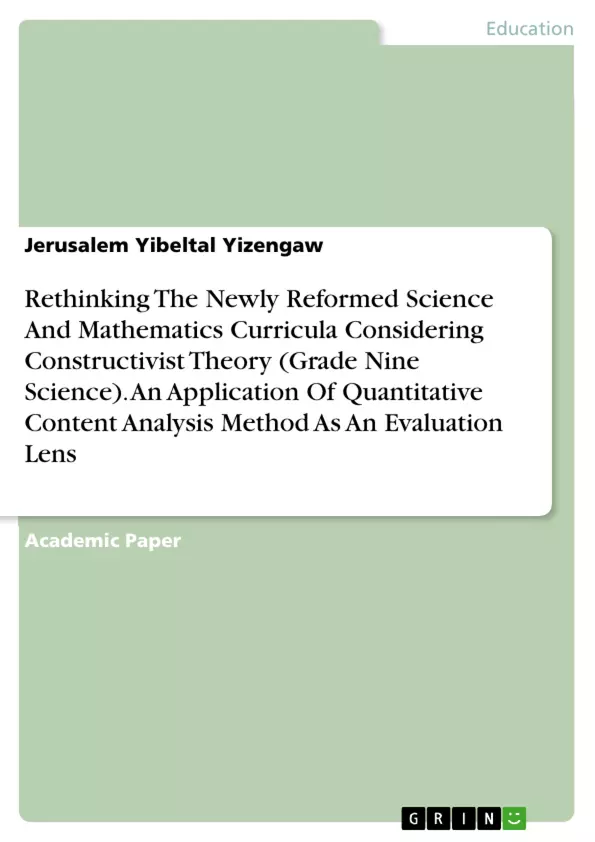The main objective of this study is to evaluate Science and Mathematics curricula considering the theory and principles of constructivism. The sample of this study will be the Grade Nine Science (in example, Biology, Chemistry and Physics) and Mathematics textbooks. To analyze the data (in this case the selected documents), quantitative content analysis method will be employed. Meanwhile, results will be provided to further improve the reformed curricula.
The beginning of modern education in Ethiopia is directly related to the advent of foreign missionaries in the 19th C. Latter a limited secular education was introduced by Emperor Menelik on the eve of the 20th C. Along with this history, various curriculum reforms have been made in the school systems. During the post-war, the first schools were opened in 1942, and there was extreme shortage of teachers and textbooks, although some British staff from the British Council was available to the government. These problems, caused for establishing a study that was considered essential to address the alleged problems, and as a follow-up education sector review was conducted in 1970-71.
Inhaltsverzeichnis (Table of Contents)
- Introduction
- Background of the Study
- Statement of the Problem
- General Objective of the Study
- Specific Objectives of the Study
- Significance of the Study
- Delimitation of the Study
- Operational Definitions
- Review Literature
- Does Curriculum Require a Theory?
- Theory and principles of constructivism
- Constructivist Theory
- Principles and Major areas of Constructivist curriculum
- Why does Constructivist Theory Matters School curricula?
- Methodological Approach
- Design and Method of the Study
- Deciding whether to use Content Analysis
- Assigning Objectives
- Data Availability or to be Collected
- Kinds of Data Required
- Kinds of Analysis Required
- Resources Needed
- Conceptualizing the Variables and Category Formation
- Determining the Number of Categories
- Selecting Material for Analysis
- Defining Document
- Choosing a Sampling Method
- Unit of Analysis
- Developing an Analysis Plan
- Presence of a Variable
- Frequency of Category
- Intensity
- Coding the Textual Material
- Types of Coding
- Creating Codes
- Coder Selection and Training
- Potential Coding Error
- Analyzing the Data
- Procedures of the Study
- Pre Testing and Checking Reliability
Zielsetzung und Themenschwerpunkte (Objectives and Key Themes)
This study aims to analyze the newly developed science and mathematics textbooks in Ethiopia, particularly focusing on their alignment with constructivist principles and their effectiveness in addressing previous challenges identified in the education system. The research intends to evaluate the curriculum reformation process in science and mathematics fields in Ethiopia, focusing on the application of constructivist theory and its impact on teaching and learning.
- Curriculum reform in Science and Mathematics
- Application of constructivist theory in education
- Analysis of newly developed textbooks
- Evaluation of the effectiveness of the curriculum reformation process
- Addressing challenges in Ethiopian education system
Zusammenfassung der Kapitel (Chapter Summaries)
The introductory chapter provides a comprehensive overview of the history of education in Ethiopia, highlighting significant curriculum reforms and their impact on the educational landscape. It outlines the background, statement of the problem, objectives, significance, delimitation, and operational definitions of the study.
The second chapter delves into the theoretical framework of the research, exploring the role of constructivism in curriculum development and examining its relevance to the Ethiopian context. It focuses on the principles and major areas of constructivist curriculum, addressing the question of whether a curriculum requires a theory.
The third chapter lays out the methodological approach of the study, detailing the design and method employed for analyzing the newly developed science and mathematics textbooks. This chapter outlines the stages of content analysis, including data collection, coding, and analysis, along with considerations for reliability and validity.
Schlüsselwörter (Keywords)
The primary keywords of the text are curriculum reform, constructivism, science education, mathematics education, textbook analysis, content analysis, Ethiopian education, education policy, and educational development.
Frequently Asked Questions
What is the main goal of this study on Ethiopian textbooks?
The study aims to evaluate Grade Nine Science and Mathematics textbooks in Ethiopia to see how well they align with the principles of constructivist theory.
Why is constructivism important for curriculum reform?
Constructivism emphasizes that learners actively construct their own knowledge. Applying this theory to school curricula can improve teaching effectiveness and student engagement.
What research method is used in this evaluation?
The study employs a quantitative content analysis method to analyze the selected textbooks and documents.
What is the history of modern education in Ethiopia?
Modern education in Ethiopia began with foreign missionaries in the 19th century, followed by secular education introduced by Emperor Menelik at the start of the 20th century.
What specific subjects are analyzed in the Grade Nine curriculum?
The analysis focuses on Biology, Chemistry, Physics, and Mathematics textbooks for Grade Nine students.
What were the challenges in the 1942 Ethiopian school system?
Post-war Ethiopia faced extreme shortages of teachers and textbooks, which necessitated subsequent education sector reviews and curriculum reforms.
- Quote paper
- Jerusalem Yibeltal Yizengaw (Author), 2013, Rethinking The Newly Reformed Science And Mathematics Curricula Considering Constructivist Theory (Grade Nine Science). An Application Of Quantitative Content Analysis Method As An Evaluation Lens, Munich, GRIN Verlag, https://www.grin.com/document/583782



